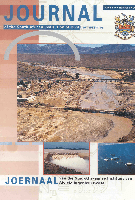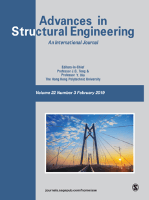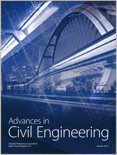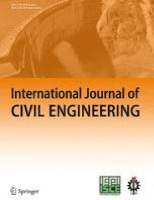
Turkish Journal of Civil Engineering
Scope & Guideline
Advancing the Future of Civil Engineering
Introduction
Aims and Scopes
- Structural Engineering:
Research related to the design, analysis, and testing of structures, including innovative materials and methods for improving structural integrity and performance. - Geotechnical Engineering:
Investigation of soil behavior, foundation design, and slope stability, with a focus on practical applications in construction and infrastructure. - Water Resources Engineering:
Studies on the management, modeling, and conservation of water resources, including stormwater management and groundwater extraction techniques. - Seismic Engineering:
Assessment and design of structures to withstand seismic activities, including innovative methods for earthquake resistance and structural safety. - Sustainable Construction Practices:
Exploration of eco-friendly materials and methods, including recycling and waste management in construction, with an emphasis on sustainability. - Transportation Engineering:
Research on traffic management, road safety, and infrastructure design, focusing on improving transportation systems and reducing accidents. - Construction Management:
Analysis of operational practices in construction projects, including the use of technology for improving efficiency and safety in the construction industry.
Trending and Emerging
- Integration of AI and Technology in Construction:
There is a growing focus on the application of artificial intelligence, augmented reality, and virtual reality in construction management and design processes, indicating a trend towards smart construction practices. - Sustainability and Eco-Friendly Practices:
Research is increasingly addressing sustainable construction methods, including the use of recycled materials and innovative waste management solutions to promote environmental conservation. - Advanced Structural Materials:
Emerging studies on the performance and application of advanced materials, such as fiber-reinforced composites and nanomaterials, are becoming more prevalent, reflecting a shift towards enhancing material properties. - Resilience Engineering in Infrastructure:
There is a notable increase in research focusing on the resilience of infrastructure to natural disasters, particularly in seismic-prone areas, highlighting the importance of robust design practices. - Data-Driven Decision Making:
The trend towards utilizing big data and analytics in civil engineering projects is emerging, with studies exploring how data can enhance project outcomes and efficiency.
Declining or Waning
- Traditional Materials Research:
Research focused on conventional materials, such as basic concrete and steel, is less prevalent as the field shifts towards innovative materials and composites. - Basic Fluid Mechanics:
Studies that primarily address fundamental fluid mechanics principles without application to modern engineering challenges are becoming less common. - Historical Construction Techniques:
Research on ancient or traditional construction methods is declining as modern engineering solutions and technologies take precedence. - Basic Structural Analysis:
Topics centered on elementary structural analysis concepts have waned as the field increasingly incorporates advanced computational methods and simulations. - Generic Safety Protocols:
Focus on broad safety protocols without integration of technology or specific case studies is becoming less emphasized in favor of more tailored, technology-driven approaches.
Similar Journals

Journal of the South African Institution of Civil Engineering
Elevating standards in civil engineering practices.Journal of the South African Institution of Civil Engineering (ISSN: 1021-2019) is a distinguished open-access publication dedicated to advancing the field of civil engineering in South Africa and beyond. Established by the South African Institution of Civil Engineering (SAICE) and South African Institute of Steel Construction (SAISI), it serves as a critical platform for sharing research, case studies, and industry developments. The journal has been openly accessible since 2015, ensuring broader dissemination of knowledge among researchers, professionals, and students alike. Although it currently holds a Q4 ranking in Civil and Structural Engineering and is positioned within the lower percentiles in Scopus rankings, its commitment to fostering growth in the engineering sector remains strong. Covering various topics from structural design to innovative construction methodologies, the journal invites contributions that push the boundaries of current practices and methodologies. This publication is essential for those invested in sustainable engineering solutions, aiming to collaborate and contribute towards the evolution of civil engineering standards in South Africa.

Civil Engineering Journal-Stavebni Obzor
Innovative Research, Unbound by BarriersWelcome to the Civil Engineering Journal-Stavebni Obzor, an esteemed academic publication dedicated to advancing the field of civil engineering. Published by the Czech Technical University in Prague, Faculty of Civil Engineering, this journal has provided a platform for innovative research and critical discourse since its inception. With an ISSN of 1210-4027 and an E-ISSN of 1805-2576, this Open Access journal has been facilitating wide dissemination of knowledge in civil engineering since 2014, ensuring that valuable research reaches a global audience without barriers. The journal is committed to fostering collaboration among researchers, professionals, and students, encouraging the exchange of ideas that drive the discipline forward. Its diverse scope encompasses various aspects of civil engineering, making it an essential resource for anyone looking to stay at the forefront of this dynamic field. Located in Prague, a hub of engineering excellence, this journal not only reflects the latest trends and innovations but also contributes to shaping the future of civil engineering.

Revista Ingenieria de Construccion
Shaping Tomorrow's Infrastructure Through Rigorous ResearchRevista Ingenieria de Construccion is a prominent open-access journal dedicated to advancing knowledge and practice in the fields of building and construction engineering, as well as civil and structural engineering. Published by the Pontificia Universidad Católica de Chile, specifically the Department of Engineering and Construction Management, this journal has been providing free access to quality research outputs since 1986, ensuring that vital information is available to both practitioners and academics globally. With its current placement in the Q4 category of both the Building and Construction and Civil and Structural Engineering quartiles, it serves as a platform for innovative studies and critical discussions, positioning itself strategically within the academic landscape. The journal is indexed in Scopus, ranking #157 in Building and Construction and #291 in Civil and Structural Engineering, reflecting the growing impact and relevance of its contributions. Researchers, professionals, and students are encouraged to engage with the rigorous and diverse content published within its pages, fostering a vibrant academic and practical discourse.

Gradevinar
Unlocking Access to Cutting-Edge Engineering InsightsGradevinar, published by the Croatian Society of Civil Engineers-HSGI, is a leading Open Access journal in the field of Civil and Structural Engineering, with a significant history that dates back to its inception in 1980. This journal, with the ISSN 0350-2465 and E-ISSN 1333-9095, has established itself as a vital platform for disseminating innovative research and practical developments in civil engineering, particularly since it became Open Access in 2000, facilitating unrestricted access to its wealth of knowledge. As of 2023, Gradevinar is ranked in the third quartile (Q3) of Scopus’s Civil and Structural Engineering category, demonstrating its growing influence and relevance in the academic community, with a current ranking of #255 out of 379 journals in the field. Researchers, professionals, and students benefit from this journal's commitment to high-quality content that reflects the latest advancements and best practices in civil engineering, contributing to both technical proficiency and sustainable development in infrastructure projects across Croatia and beyond.

Electronic Journal of Structural Engineering
Elevating Engineering Standards through Open Access ScholarshipThe Electronic Journal of Structural Engineering (ISSN: 1443-9255), published by EJSE INT LTD, serves as a vital platform for disseminating innovative research and developments in the field of structural engineering. Since its inception in 2001, the journal has evolved to embrace an Open Access model starting in 2022, ensuring that cutting-edge findings are freely accessible to researchers, professionals, and students worldwide. Housed within the reputable Department of Infrastructure Engineering at the University of Melbourne, Australia, the journal focuses on a wide range of topics related to civil and structural engineering, positioning itself within the Q4 category on the 2023 Scopus rankings. While its H-index and detailed scope data are currently unavailable, the journal's commitment to quality research is evident through its continuous publication and engagement with the global academic community. With significant implications for contemporary engineering practices, The Electronic Journal of Structural Engineering not only fosters scholarly discourse but also encourages practical applications of structural engineering advancements.

ADVANCES IN STRUCTURAL ENGINEERING
Fostering Collaboration for Sustainable Construction SolutionsADVANCES IN STRUCTURAL ENGINEERING, published by SAGE PUBLICATIONS INC, is a leading journal dedicated to the advancement of knowledge in the fields of Building and Construction, as well as Civil and Structural Engineering. With a solid impact factor and a commendable Scopus ranking (Rank #60 in Building and Construction, Rank #105 in Civil and Structural Engineering), this journal stands at the forefront of academic research, providing a platform for high-quality articles that contribute significantly to the discipline. Covering a range of topics from innovative construction techniques to sustainable engineering practices, the journal aims to foster collaborative dialogue among researchers, industry professionals, and students alike. As of 2023, it boasts impressive category quartiles, ranking Q1 in Building and Construction and Q2 in Civil and Structural Engineering. ADVANCES IN STRUCTURAL ENGINEERING is a vital resource for those looking to stay abreast of emerging trends and groundbreaking developments in structural engineering, promoting an environment of continuous learning and application of best practices. With a convergence of research from 1999 to 2024, the journal not only emphasizes theoretical frameworks but also bridges the gap between academia and practical application in engineering projects.

Periodica Polytechnica-Civil Engineering
Bridging Theory and Practice in Engineering ExcellencePeriodica Polytechnica-Civil Engineering is a prestigious journal published by the Budapest University of Technology and Economics, dedicated to advancing the field of civil engineering through high-quality research and innovative practices. Established in 1972, the journal has transitioned through various phases of publication and now spans an expansive range of topics within civil and structural engineering, geotechnical engineering, and engineering geology. With an impact factor indicating its growing influence and a commendable placement in the Q3 quartile according to the latest 2023 metrics, it recognizes contributions that bridge theoretical advancements with practical applications. While currently not open access, the journal remains a vital resource for researchers, professionals, and students seeking to stay abreast of the latest developments in engineering design, construction techniques, and geotechnical innovations. The continuous publication of significant research after almost five decades underscores its commitment to disseminating knowledge crucial for the world’s infrastructure challenges, making it an essential reference point within the engineering community.

Advances in Civil Engineering
Shaping Tomorrow's Civil Engineering TodayAdvances in Civil Engineering is a leading peer-reviewed journal published by HINDAWI LTD, dedicated to advancing knowledge and innovation in the field of civil and structural engineering. Holding an esteemed Q2 ranking in the 2023 category for Civil and Structural Engineering, this journal serves as a vital platform for disseminating cutting-edge research and practical applications that address contemporary challenges in infrastructure development, sustainable design, and material science. Launched in 2008 and operating as an Open Access journal since 2009, it promotes the free exchange of ideas by ensuring that all articles are accessible to researchers, professionals, and students globally. The journal is also indexed in Scopus, ranking at #142 out of 379 in its category, situating it within the 62nd percentile of its peers. With a focus on interdisciplinary collaboration and innovative solutions, Advances in Civil Engineering contributes significantly to the ongoing evolution of engineering practices and education, making it an essential resource for anyone involved in or studying the ever-evolving field of civil engineering.

KSCE Journal of Civil Engineering
Fostering Global Collaboration in Engineering InnovationKSCE Journal of Civil Engineering is a prestigious international publication dedicated to advancing the field of civil engineering. Established by the Korean Society of Civil Engineers (KSCE), this journal serves as a vital platform for high-quality research in the discipline, showcasing innovative methodologies, case studies, and critical analyses pertinent to civil and structural engineering. With an impact factor placing it in the Q2 category of civil engineering journals for 2023 and a solid Scopus rank of #141 out of 379, it reflects the significant contributions of its authors and the growing recognition of its published works. KSCE Journal of Civil Engineering, based in Germany and easily accessible to the global research community, is committed to disseminating knowledge with rigor and integrity, encouraging both emerging scholars and seasoned experts to contribute to the evolving discourse in civil engineering. With a convergence period from 2009 to 2024, the journal continues to uphold its mission of fostering innovation and excellence in engineering practice.

International Journal of Civil Engineering
Advancing Sustainable Solutions in Civil EngineeringThe International Journal of Civil Engineering, published by Springer International Publishing AG, is a premier platform dedicated to advancing the field of civil engineering. With a notable impact factor and a strong reputation reflected in its Q2 quartile rankings in both Civil and Structural Engineering as well as Geotechnical Engineering and Engineering Geology, this journal facilitates the dissemination of high-quality research from 2009 through 2024. Researchers and professionals can access cutting-edge studies and innovative practices that address contemporary challenges in civil engineering, such as sustainable infrastructure development, environmental impacts, and advanced material technologies. Situated in Switzerland, the International Journal of Civil Engineering emphasizes the critical interplay between theory and application, making it an essential resource for students, academics, and industry leaders seeking to stay at the forefront of their disciplines.